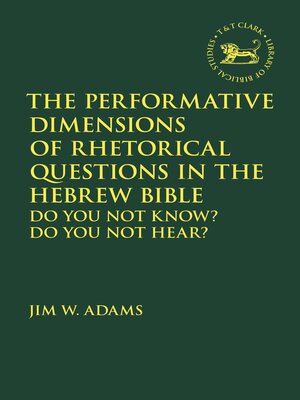The Performative Dimensions of Rhetorical Questions in the Hebrew Bible
ebook ∣ Do You Not Know? Do You Not Hear? · The Library of Hebrew Bible/Old Testament Studies
By Jim W. Adams

Sign up to save your library
With an OverDrive account, you can save your favorite libraries for at-a-glance information about availability. Find out more about OverDrive accounts.
Find this title in Libby, the library reading app by OverDrive.



Search for a digital library with this title
Title found at these libraries:
| Library Name | Distance |
|---|---|
| Loading... |
This book sets out to describe the multi-dimensional nature and function of rhetorical questions in the Old Testament. Biblical scholars have previously analyzed the use of rhetorical questions in both Testaments, but consistently describe their function in persuasive terms. While this understanding is appropriate in a number of instances, many rhetorical questions do not operate this way, and Jim W. Adams focuses in particular on rhetoric expressing the self-involvement of both the speaker and hearer.
Among linguistic philosophers, speech act theory has illuminated the fact that uttering a sentence does not merely convey information; it may also involve the performing of an action. The concept of communicative action provides additional tools to the exegetical process as it points the interpreter beyond the assumption that the use of language is merely for descriptive purposes. Language can also have performative and self-involving dimensions. In relation to speech act theory, linguistic specialists continue to research the nature of rhetorical questions.
Among linguistic philosophers, speech act theory has illuminated the fact that uttering a sentence does not merely convey information; it may also involve the performing of an action. The concept of communicative action provides additional tools to the exegetical process as it points the interpreter beyond the assumption that the use of language is merely for descriptive purposes. Language can also have performative and self-involving dimensions. In relation to speech act theory, linguistic specialists continue to research the nature of rhetorical questions.







